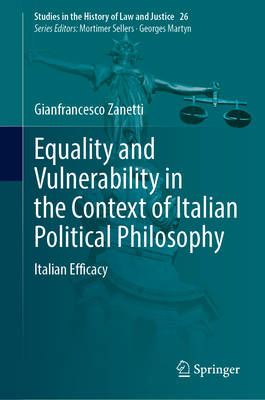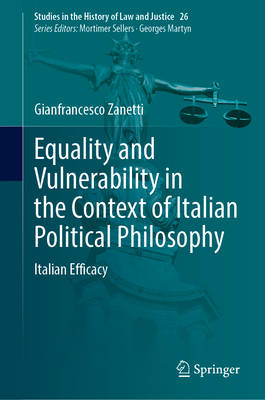
- Retrait gratuit dans votre magasin Club
- 7.000.000 titres dans notre catalogue
- Payer en toute sécurité
- Toujours un magasin près de chez vous
- Retrait gratuit dans votre magasin Club
- 7.000.0000 titres dans notre catalogue
- Payer en toute sécurité
- Toujours un magasin près de chez vous
Equality and Vulnerability in the Context of Italian Political Philosophy
Italian Efficacy
Gianfrancesco Zanetti
137,45 €
+ 274 points
Format
Description
One of the main goals of this book is to determine if, in the works of some of the key authors in the history of Italian political philosophy, a notion of "efficacy" can be found. In legal philosophy, "efficacy" is the capacity a norm has to effectively influence citizens' behavior. The "principle of efficacy" is that according to which an order or rule exists as such when it is followed effectively in practice. Here by "efficacy" I mean the idea that normative phenomena are self-justifying, without reference to extrinsic systems of value (such as "natural law"). The examinations of several texts undertaken here constitute reflections on this theme, without any claim to systematicity. They have been grouped together, roughly in historical order, by their common respect for the contexts within which they reason and reach decisions, which lends them a characteristic flavor of harsh realism that at times relies on a minimalist use of traditional normative categories.
The second theme that emerges through the respective chapters (each of which constitutes the text for a lesson in a course for Ph.D. students) is that of the relationship between "equality" and "vulnerability." Here the idea is to elaborate a concept of "vulnerability" that is not underpinned by what we in Italy call an "anthropology," that is, a fixed notion of human nature. Instead this concept should be comprehensible and graspable solely on the basis of the recognition of decisions and actions that are merely "efficacious," that function "for what they are, and what they do." This recognition doesn't even need to be explicitly articulated by these authors with any specific, deliberately conscious awareness.
The goal is not to identify a precise tradition of thought, one which elaborates a given line of reflection, but rather to highlight certain "themes" that emerge in the texts examined, even as the authors write with and for their own specific,contingent set of motives, which differ from time to time and place to place. These authors include some who are widely known, such as Dante, Machiavelli, and Beccaria. At times they are figures who typify certain key historical episodes, such as the Risorgimento (Giuseppe Mazzini) or Fascism (Cesare Lombroso and Santi Romano), while others reflect certain aspects of a contemporary debate (Pasolini and the "Braibanti affair").
The book is based on lectures given for a 2021 Ph.D. Course at the University of California, Berkeley's Department of Italian Studies.
The second theme that emerges through the respective chapters (each of which constitutes the text for a lesson in a course for Ph.D. students) is that of the relationship between "equality" and "vulnerability." Here the idea is to elaborate a concept of "vulnerability" that is not underpinned by what we in Italy call an "anthropology," that is, a fixed notion of human nature. Instead this concept should be comprehensible and graspable solely on the basis of the recognition of decisions and actions that are merely "efficacious," that function "for what they are, and what they do." This recognition doesn't even need to be explicitly articulated by these authors with any specific, deliberately conscious awareness.
The goal is not to identify a precise tradition of thought, one which elaborates a given line of reflection, but rather to highlight certain "themes" that emerge in the texts examined, even as the authors write with and for their own specific,contingent set of motives, which differ from time to time and place to place. These authors include some who are widely known, such as Dante, Machiavelli, and Beccaria. At times they are figures who typify certain key historical episodes, such as the Risorgimento (Giuseppe Mazzini) or Fascism (Cesare Lombroso and Santi Romano), while others reflect certain aspects of a contemporary debate (Pasolini and the "Braibanti affair").
The book is based on lectures given for a 2021 Ph.D. Course at the University of California, Berkeley's Department of Italian Studies.
Spécifications
Parties prenantes
- Auteur(s) :
- Editeur:
Contenu
- Nombre de pages :
- 135
- Langue:
- Anglais
- Collection :
- Tome:
- n° 26
Caractéristiques
- EAN:
- 9783031355523
- Date de parution :
- 17-08-23
- Format:
- Livre relié
- Format numérique:
- Genaaid
- Dimensions :
- 156 mm x 234 mm
- Poids :
- 381 g

Les avis
Nous publions uniquement les avis qui respectent les conditions requises. Consultez nos conditions pour les avis.






